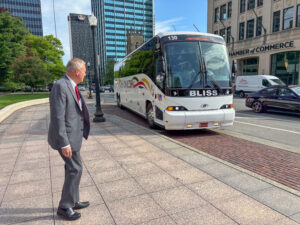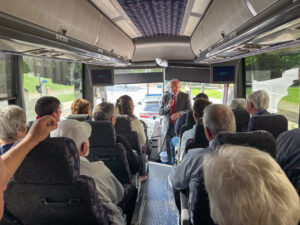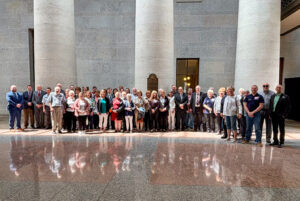Seneca County Commissioners testify on SB 119 at Ohio Statehouse
By Sheri Trusty, Seneca County Media Relations Coordinator

While many Seneca County residents are walking out their front doors to views of budding trees and blooming spring flowers, residents living near the WIN Waste of Seneca County landfill are seeing the same thing they’ve seen for years: a growing mountain of waste. Spring has arrived in Seneca County, and local leaders are hoping to bring Fostoria into a new season of change as they continue their efforts to support Senate Bill 119.

SB 119, which was sponsored by State Senator Bill Reineke, would provide expanded authority and resources to the Seneca County General Health District for oversight of the landfill. Among the bill’s key provisions is the creation of an exit strategy that would allow counties, including Seneca County, to leave joint solid waste districts, empowering them to provide optimal, protective, solid waste services for their residents.
Seneca County is part of the Ottawa, Sandusky, Seneca (OSS) joint solid waste district.
On May 1, several local leaders – including Seneca County Commissioners Anthony Paradiso, Bill Frankart and Tyler Shuff – traveled to the Ohio Statehouse in Columbus for the fourth hearing of SB 119 before the House Energy and Natural Resources Committee. Paradiso, Frankart and other local leaders testified before the committee in support of the bill.
SB 119 passed unanimously in the Ohio Senate, and local leaders are hoping the bill will soon be voted out of committee and come before the House.

Among the issues discussed during the hearing was the massive size of the landfill. Frankart presented a video that spanned the expanse of the landfill to help committee members comprehend its enormity.
“To provide some perspective, according to the Ohio Environmental Protection Agency, the WIN Waste of Seneca County landfill received approximately 2.3 million tons of waste in 2023,” Frankart said.
Frankart, a lifelong farmer, expressed concern about WIN Waste’s absorption of valuable farmland and its effect on local businesses.
“The loss of farmland has a far-reaching impact. Lost farmland affects farmers and the local small businesses and co-ops that support agriculture, including Mennel Milling, Archer Daniels Midland Co., and Poet Bioprocessing who are feeding and fueling the nation from Fostoria, Ohio,” he said.
If the bill is passed, Seneca County will consider the option of withdrawing from OSS. Currently, the county receives OSS funds disproportionate to the large percentage of waste it manages.

“Seneca County receives just a small percentage of OSS’s revenues to reimburse us for the cost of regulation of the WIN Waste of Seneca County landfill, even though this landfill receives 96% of the tonnage dumped in the OSS district,” Paradiso said in his submitted testimony.
Although the WIN Waste landfill was originally created as a local landfill, it now accepts out-of-state trash almost exclusively. Ben Nutter, who leads Community Engagement and Government Affairs for WIN Waste Innovations, said about 98% of the waste coming to the landfill is from out of state. As a result, the Seneca County General Health District is responsible for the oversight of somebody’s else trash, while state law restricts its ability to provide comprehensive supervision.
Paradiso said SB 119 would loosen the legal fetters that are binding the health department.
“Sometimes your hands are tied, and you need help so you can do your job,” Paradiso said. “We’re not asking you to solve our problems. We’re asking you to untie our hands so we can solve our own problems.”
Nearly 60 Seneca County residents attended the meeting to show their support of SB 119. Among them was lifelong Fostoria area resident, Susan Platt, who referred to Seneca County as “a sacrifice zone.” Many Seneca County residents, like Platt, have voiced fear and frustration over landfill practices for years.

“We in Ohio are far behind in legislating protection for all of our citizens,” Platt said. “As policy makers, legislators are here to put policies in place to reflect what is best for Ohio.”
Through the years, many local residents have lost faith that WIN Waste will operate in the community’s best interests. They have lived too long in the shadow of the landfill’s potential impact on their health and wellbeing.
Nutter acknowledged the validity of the community’s lack of trust.
“They’re certainly upset about past performance, and they have every right to be,” Nutter said.
